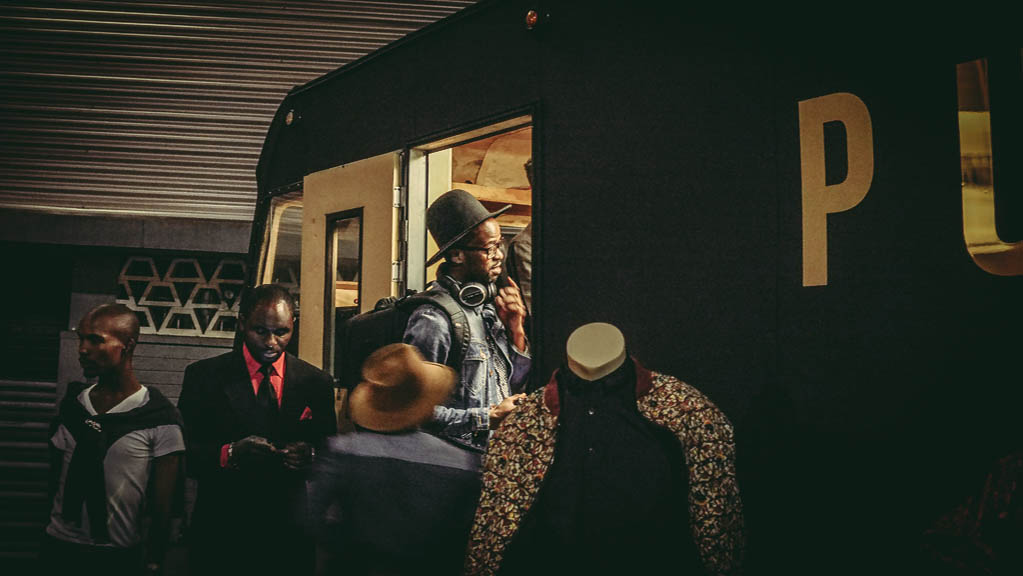‘South African fashion is in a state of flux,” says Bianca Sibiya, the director and one half of mobile boutique Punk & Ivy Style Motique.
Bianca and her husband, Khaya Bhubesii Sibiya, the boutique’s creative director, were inspired to take their fashion to the streets by the mobile bars in Bangkok and the Airstream trailer culture in the United States.
“Being able to create a static space to merchandise garments and interact with customers is great, but being able to offer that same solution inside a cool-looking motique makes it a far more exciting offering, and that’s what we want people to enjoy,” says Bianca.
The unisex label takes its name from the marriage of the distinctive style aesthetics of this husband and wife team.
Bianca says: “My personal style is very simple. Bhubesii and I have a one-year-old son, which means sticky fingers. I love oversized shirts, African prints, brogues, sneakers and endless pairs of selvedge denim. I love unisex garments, and being able to dip into my partner’s endless collection of shirts and pants has definitely been a major source of inspiration for Punk & Ivy.”
Bhubesii describes his style as new-age Ivy League meets sports luxe. “I collect sneakers, and owning a label means I am able to play with various fabrics and leathers to build a collection of shirts, blazers and pants that are timeless.”
As a professional stylist for TV and print, he says he is able to understand how different people are in terms of their tastes, budgets and wardrobe.
“For our business, it means working with each client, understanding their comfort zones, and creating a look they love, which means repeat business,” he says.
Bianca’s strong marketing background and work in creative industries such as music, TV and South African film, where budgets are very tight, has taught her how to be resourceful with very little, as well as understanding the value of packaging an idea and making it commercially viable.

Followers of the budding brand have been privy to the journey they began in 2012 and which has led to the launch of their mobile fashion business.
“Finding start-up capital was very tricky as one needs to be making money to get money,” says Bianca. “We had an idea, a plan and some stock. We needed funding to build the motique and, after many doors were shut, we realised that we needed to find alternative methods. We eventually signed on an investor, Tshepho Dlamini, who also happens to be a family member of ours – and, thankfully, he has been incredibly supportive and patient as we establish the business.”
The pimped-out motique is a veritable treasure chest for lovers of their style.
“We have developed a beautiful African print in collaboration with a designer called Greiispaces,” says Bianca. “The Androgynous capsule collection is made from fabrics that look and feel luxurious, but still have a streetwear style in muted and warm tones that are perfect for autumn.”
Targeted at the twentysomething-plus working professional, the brand’s typical customers are described as young Africans who see clothing as an extension of themselves, a personal expression, and something they choose to invest in.
The fashion outlet Legit, which has collaborated with personalities such as Noni Gasa, Nandi Mngoma and Lalla Hirayama, has created a 2015 autumn/winter collection with the Sibiyas.
“Lots of Instagram pics of our garments, as well as pushing the whole idea of finding your sense of Africanism in your dress, must have caught the eye of the team at Legit and Black River, as we received a call in September, [and] pitched and delivered the entire collection in just under a few weeks,” Bianca says.
 Punk & Ivy Style’s mobile boutique
Punk & Ivy Style’s mobile boutique
“We also love that they see value in the motique, so they will be using it to launch the Don’t Conform collection in their roadshows from mid-April 2015.”
Looking ahead, Punk & Ivy want to start a CMT (cut, make and trim establishment) in Johannesburg and hope to attract the talents of young pattern makers and tailors.
Bianca says: “We want to employ more craftsmen who work with leather, wool and suiting. We want to lobby the DTI [department of trade and industry] and government to invest more money in our crumbling textile industry, because currently almost every South African is wearing garments most likely made in the East with fabrics from elsewhere.
“Our African prints sold across South Africa are not even made in South Africa, but in Holland, etcetera. We have a duty to create a solution for the lack of support for local garments, and we plan to tackle it one year at a time.
“Every single person wears clothing every day and that means there will always be a market, so why are we not making it easy and affordable for our people to buy local?”
Punkandinvy.com goes live as an online store on March 31.
For updates on trading, follow them on instagram.com/punkandivy and facebook.com/punkandivymotique